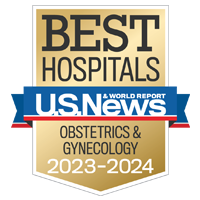Ovarian Cysts

Overview
Many women will be diagnosed with an ovarian cyst at some time in their lives. An ovarian cyst is a fluid-filled sac in or on the ovary.
The majority of ovarian cysts in pre-menopausal women will be "normal" cysts, related to development of the egg in the ovary and ovulation. These cysts will almost always go away over time.
Our Approach to Ovarian Cysts
Most ovarian cysts are harmless and go away on their own. If a cyst grows or causes symptoms, it can be removed surgically, often via laparoscopy, a minimally invasive technique. This approach has several benefits compared to traditional surgery, including faster recovery and less scarring.
At UCSF, our mission is to provide all women who come to us with the highest quality care as well as the knowledge they need to make informed decisions about their health. We encourage each patient to participate in choosing the best treatment option for her.
Awards & recognition
-

Among the top hospitals in the nation
-

One of the nation’s best in obstetrics & gynecology
Signs & symptoms
Sometimes cysts are found because a woman is having pain or discomfort, and sometimes they are felt during a routine pelvic examination.
Diagnosis
When a cyst is found in a woman who is still having normal periods, it is important to monitor it to see if it gets smaller or resolves over the course of four to six weeks. An ultrasound, an imaging test that uses sound waves to create a picture of the inside of the body, is an accurate and painless way to monitor an ovarian cyst. Cysts that get smaller between two different ultrasounds usually require no further treatment.
Ovarian masses that don't get significantly smaller or disappear over the course of a month or two are more likely to be tumors. These tumors are generally benign, or non-cancerous, especially in younger women. Sometimes ultrasound or other imaging tests, such as an MRI, can determine that the cysts are non-cancerous. If they are also small and don't cause any symptoms, they can often just be monitored periodically. If a cyst is larger, or if it is difficult to accurately determine the kind of cyst, it will most likely need to be removed surgically.
Treatments
Ovarian cysts can often be removed via laparoscopy, a surgical technique that uses several tiny incisions in the abdomen. Sometimes, if the cyst is quite large or if a woman is older, it is better to do the operation through a larger abdominal incision.
Often just the cyst can be removed, leaving the ovary in place, but sometimes it is necessary to remove the entire ovary. If an ovary is removed, the other remaining ovary will take over the function for both ovaries, so menstrual periods and fertility generally aren't affected.
UCSF Health medical specialists have reviewed this information. It is for educational purposes only and is not intended to replace the advice of your doctor or other health care provider. We encourage you to discuss any questions or concerns you may have with your provider.











